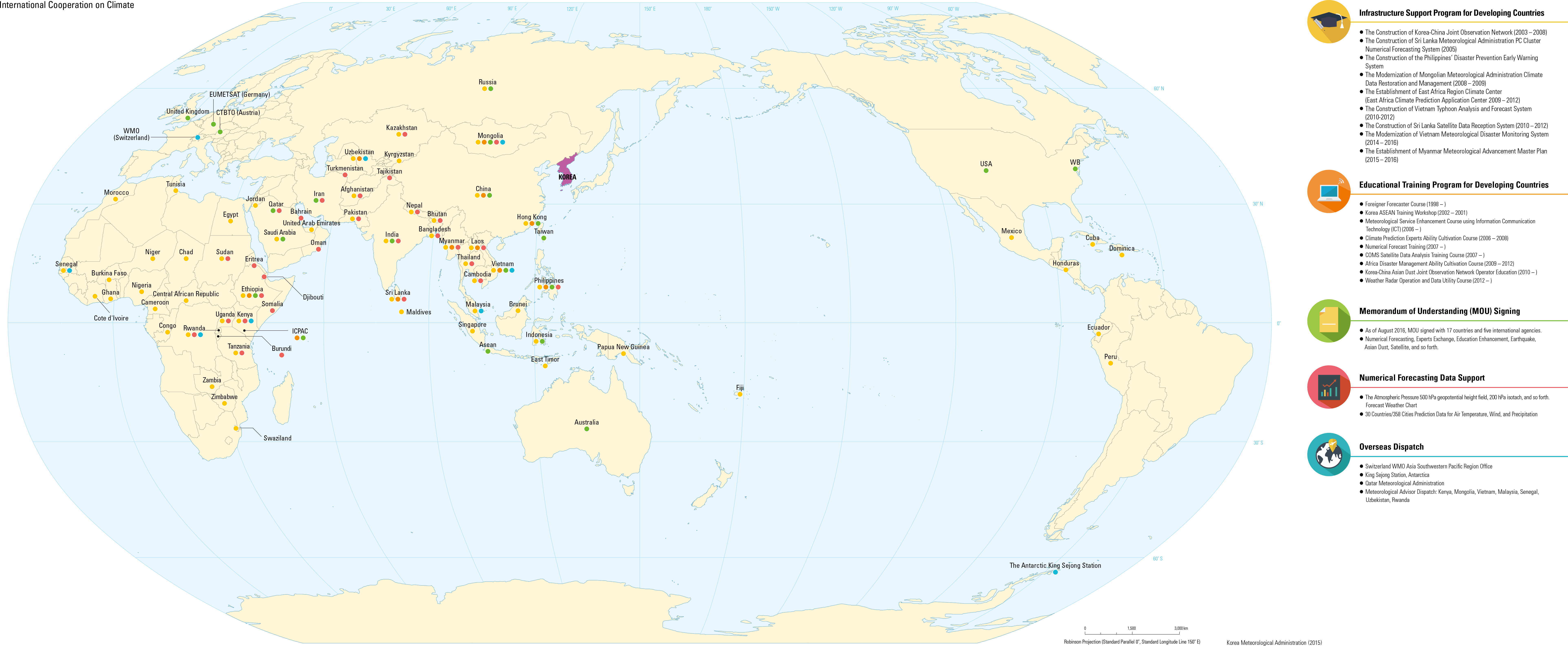English II
Korea carries out multilateral cooperation through international organizations including the World Meteorological Organization (WMO). WMO is one of UN agencies specialized in the meteorological field, with international author- ity over issues regarding atmospheric flow, the interaction between atmosphere and ocean, and climate-hydrology. After the foundation of the WMO in 1950, its membership has grown to a total of 191 countries, including Korea, joined as the 68th country in 1956. The Korea Meteorological Administration (KMA) has been keeping its status as an exec- utive council member of the WMO since 2007. The executive council is a core executive agency of the WMO, taking charge of supervising main policies such as the coordination of scientific technology and budget allocation. It is composed of head administrators from 37 member coun- tries. The election of KMA’s head administrator as an executive council member at the 17th World Meteorological Congress, in Geneva, Switzer- land, 2015 was a great achievement for Korea as it raised the nation’s status to a third term ex- ecutive council member country. This could not have been possible without Korea’s participation based on its foreign policy of trust into diverse international activities in meteorological field, headed by the WMO. As of 2016, the percentage of Korea’s nancial contribution to the WMO is 2.01%, which ranks Korea as 13th among mem- ber countries. The KMA is expected to strengthen its contribution as a part of leading international meteorological community group. Also, the KMA was officially designated as a WMO Regional Training Center (RTC) at the 17th World Meteorological Congress due to its international reputation for outstanding perfor- mance on education-training sections. Since then, the KMA is equipped with enhanced system, enabling Korea to share its long-accumulated ex- pertise, technology, experience, and so forth. with other members of the WMO. With the system, the KMA is planning to make specialized educational courses in accordance with the WMO education policy to lay a foundation for RTC operation base. Another noticeable accomplishment is the election of the rst Korean chairman of the IPCC (Intergovernmental Panel on Climate Change), having unparalleled authority over global cli- mate change negotiations. IPCC is an agency established jointly by the WMO and the United Nations Environment Programme (UNEP) in 1988 to handle climate change issues. The elec- tion of a Korean chairman of the IPCC in 2015 demonstrates the nation's international renown for coping with climate change. The KMA continues to fortify its position and in uence in the interna- tional meteorological community by actively par- ticipating in international activities and training domestic experts. In 1994, a memorandum of understanding (MOU) on bilateral cooperation in the field of meteorology between the KMA and the China Meteorological Administration (CMA) was made. Since then, MOUs on bilateral cooperation in meteorology were made with the Australian Bu- reau of Meteorology in 1996, the Russian Federal Service for Hydrometeorology and Environment Monitoring in 1999, and the U.S. National Weath- er Service in 2000. Also, MOUs with Qatar and Saudi Arabia were made respectively in 2013 and 2015, not only extending KMA’s meteorologi- cal cooperation with the Middle East countries but also paving the way for expanding Korean meteorological industry around the world. As a result, up until 2016, a total of 17 countries and 5 international agencies have made agreements on bilateral cooperation with the KMA. The KMA has been keeping strong reciprocal relationship with its partners by opening bilateral cooperation convention in 2 – 3 year cycles, op- erating working groups, dispatching experts, and so on. In addition, the KMA is promoting cooper- ation with developed countries, including the US and the UK, to acquire state-of-the-art technolo- gies such as next generation meteorological sat- ellite technology, the introduction of UM model, operation technology, and so forth. Moreover, the KMA is promoting the construction of cooper- ation system with developing countries such as Vietnam and Mongolia with ODA program and capacity development program operation as the central gures. The capacity of ODA began to develop since 1998 through educational programs of the KMA and KOICA. Since then, there have been training courses such as weather forecast training course for meteorological trainees of about 700 from 69 countries. These courses contribute greatly to the development of capability in predicting meteoro- logical disasters in developing countries by cul- tivating staffs for meteorological administrations with abilities to utilize radar, acquire advanced technique of weather forecast, and understand and utilize numerical forecasting. Building the capacity of ODA began in 2003 in cooperation with the KOICA and WMO. So far, about 20 programs including modernizing the Mongolian aviation weather, constructing the early warning system to mitigate the disasters in the Philippines, advancing the Vietnamese meteorological disaster monitoring system, and establishing a master plan for the advancement in meteorological technology of Myanmar have been completed. Supporting developing coun- tries in their effort to advance in meteorological technology through the installation of large-scale system helps promote domestic meteorological technology. This has contributed to an increase in export of Korea's meteorological brands and do- mestic meteorological enterprises. World Friend Senior Expert Dispatch Program, conducted by the Ministry of Science, ICT and Future Planning and carried out by the National IT Industry Promotion Agency, is a program dis- patching senior experts to developing countries to support and provide advice regarding meteo- rological technology. Teams of meteorological advisors have been sent 19 times to countries such as Vietnam, Mongolia, Kenya, Uzbekistan, and so forth from 2010 to 2016. With their efforts, the KMA was able to iden ty demand in meteorological technology in those countries and has consolidated its international status.
page_2 |
